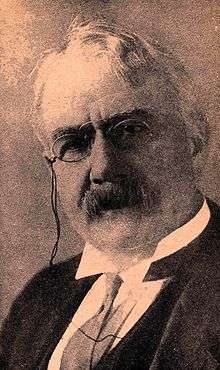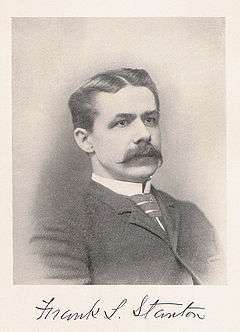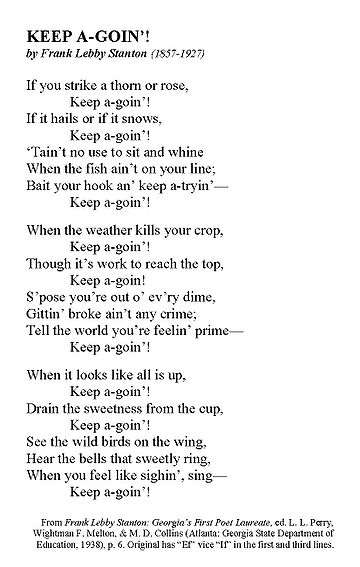Frank Lebby Stanton
| Frank Lebby Stanton | |
|---|---|
 | |
| Born |
February 22, 1857 Charleston, South Carolina, United States |
| Died |
January 7, 1927 (aged 69) Atlanta, Georgia |
| Pen name |
Frank L. Stanton Frank Stanton F. L. Stanton |
| Occupation | Poet, lyricist, columnist |
| Nationality | United States |
| Ethnicity | Caucasian |
| Literary movement | Early Southern Renaissance |
| Notable works |
"Just Awearyin' for You" "Mighty Like a Rose" ""Morning" |
Frank Lebby Stanton (February 22, 1857 – January 7, 1927),[1] frequently credited as Frank L. Stanton, Frank Stanton or F. L. Stanton, was an American lyricist.
He was also the initial columnist for the Atlanta Constitution and became the first poet laureate of the State of Georgia, a post to which he was appointed by Governor Clifford Walker in 1925 and which Stanton held until his death.[2]
Eminence
Stanton was born in Charleston, South Carolina, to Valentine Stanton (a printer, Confederate soldier, and farmer) and his wife Catherine Rebecca Parry Stanton, whose father owned a plantation on Kiaweh Island. From early childhood he was influenced by the hymns of Isaac Watts and Charles Wesley and was reared in the Methodist Episcopal Church, South. After starting school in Savannah, Georgia, Frank Lebby Stanton found his education cut off by the American Civil War. At the age of 12 he became apprenticed to a printer, a position which allowed him to enter the newspaper business. In 1887 he met Leone Josey while he was working for the Smithville News; they married and, in 1888, moved to Rome, Georgia, where Frank Lebby Stanton had received an offer from John Temple Graves to serve as night editor for the Rome Tribune. With encouragement from Joel Chandler Harris, Stanton in 1889 switched to the Atlanta Constitution (where for a few months he worked for Henry W. Grady prior to Grady's death), and began to focus more on writing editorials and columns, a newspaper role which he filled from then until Stanton's death in 1927.[3] Stanton's writing became quite popular and assiduously read. His column News from Billville (later Up from Georgia) forms the basis for claims that he was even the prototype for American newspaper columnists.[4] Frank Lebby Stanton died, aged 69, in Atlanta, Georgia. He and Leone Josey Stanton were survived by their children—Marcelle Stanton Megahee and Frank Lebby Stanton Jr.[5]

Verse
Frank Lebby Stanton's verse is marked by simplicity and charm as well as sentimentality which was then en vogue. His poems include a number which he wrote in dialect, a challenge for which he had special knack, such as "Mighty Lak a Rose" (which was set to music by Ethelbert Nevin [1862-1901]). The music for "A Plantation Ditty" (first line "De gray owl sing fum de chimbly top") by Stanton was composed by Sidney Homer.[6] Several of Stanton's ballads were set to music by Oley Speaks.[7] Possibly Stanton's most successful hit in popular music was his lyrics for the wildly selling 1901 parlor song "Awearyin' for You" for which Carrie Jacobs-Bond provided the familiar tune.[8] "Linger Not" and "Until God's Day" are two other songs on which Stanton and Jacobs-Bond collaborated.[9]
Productivity
According to the Online Computer Library Center (OCLC), Stanton's writings include 171 items in 309 publications in 3 languages and 1,483 library holdings" (OCLC WorldCat hits).[10]

Collections of his work are listed by Connecticut State Library,[11] Valdosta State University,[12] University of Rochester (Eastman School of Music),[13] and Music Australia.[14]
On many occasions, leading to his selection as poet laureate, Stanton was called on to furnish poetry for occasions of state, one of them being the opening of Atlanta's Cotton States and International Exposition (1895).[15] On 1916 February 23, the day after Stanton's 59th birthday, public schools throughout Georgia held commemorations of his achievements. Walker, in appointing Stanton Georgia's poet laureate, stated that no one had ever previously been appointed poet laureate of any southern state.[16]

Legacy
Stanton has been frequently compared with Indiana's James Whitcomb Riley or called "the James Whitcomb Riley of the South"; Stanton and Riley were close friends who frequently traded poetic ideas.[20] Although Stanton frequently wrote in the dialect of black southerners and poor whites, he was an opponent of the less-admirable aspects (such as lynching) of the culture in which he lived, and he tended to be compatible in philosophy with the southern progressivism of his employer, the Atlanta Constitution, for which he wrote editorials. These and other characteristics of Stanton are well elaborated in the scholarly essays on him by Francis J. Bosha[21] and Bruce M. Swain.[22]

Shortly after his death Stanton was commemorated in the naming of the Frank Lebby Stanton Elementary School, which, after the redesignation of a street name for its eponym still unborn at the time of Stanton's death, is at 1625 Martin Luther King Jr. Drive in Atlanta.[23]
Five items by Stanton appear in Edmund Clarence Stedman's American Anthology 1787-1900, published in 1900:[24]
- "One Country" (Stedman's Item 1286)
- "A Plantation Ditty" (Stedman's Item 1287)
- "The Graveyard Rabbit" (Stedman's Item 1288)
- "The Mocking-Bird" (Stedman's Item 1289)
- "A Little Way" (Stedman's Item 1290)
One of Stanton's works most widely quoted during his lifetime was a quatrain titled "This World"; it is enscribed on his tombstone in Atlanta's Westview Cemetery:[25]
- This world we're a'livin' in
- Is mighty hard to beat.
- You get a thorn with every rose.
- But ain't the roses sweet?
Musical settings of his poetry
Stanton collaborated with African American composer Harry Thacker Burleigh in the sheet music for his poem "Jean" (Burleigh composed and harmonized the tune).[26] American composers of art songs such as Ethelbert Nevin and Carrie Jacobs Bond wrote songs to his verses; composer Oley Speaks also set at least four of his poems to music: "The Hills of Dawn", "In Maytime", "Morning",[27] and "When Mabel Sings". Joshua Emdon set his famous "Keep-A' Goin'!"
References
- ↑ Stanton entry in the U.S. Dictionary of Literary Biography.
- ↑ Biographical information with Stanton's "Keep a-Goin'" poem. For further information see Bookrags.com essay on Stanton (requires fee).
- ↑ Harris and Stanton shared an office on the fifth floor of the Atlanta Constitution 's building. Visitors to that office included Richard Malcolm Johnson, Hamlin Garland, Thomas Bailey Aldrich, Paul Hamilton Hayne, Charles A. Dana, Joaquin Miller, James Ryder Randall, Samuel Minturn Peck, Will Hamilton Hayne, Fred Emerson Brooks, James Whitcomb Riley (whom Stanton referred to as "Jim"), and Major Charles William Hubner.Perry, L.L.; Wightman, Melton F. (1938), Frank Lebby Stanton: Georgia's First Post Laureate, Atlanta: Georgia State Department of Education., pp. 32, 12 For further information on Hubner see the Oglethorpe University Hubner site.
- ↑ Commentary on Stanton by America.net.
- ↑ Perry, L.L.; Wightman, Melton F. (1938), Frank Lebby Stanton: Georgia's First Post Laureate, Atlanta: Georgia State Department of Education., p. 41
- ↑ Harry Colin Thorpe, "The Songs of Sidney Homer" in Musical Quarterly, Vol. XVII (1931), pp. 47-73.
- ↑ See the list in the Speaks article in the Dutch Wikipedia.
- ↑ Stanton information on Recmusic.org, which source also indicates that Nevin provided tunes for other Stanton poems including "Necklace of Love" (a.k.a. "No Rubies of Red for My Lady") and "Sleeping and Dreaming"; see also RecMusic's Ethelbert Nevin site. Stanton's "Just Awearyin' for You" lyrics were also matched by composer Harry T. Burleigh in 1906, but Burleigh's tune never gained the currency of the one by Jacobs-Bond. See Professor De Lerma's essay Henry "Harry" T. Burleigh (1866-1949): African American Composer, Arranger & Baritone" which notes the following tune for "Just Awearyin' for You" by African-American composer Harry T. Burleigh:
- Just a-wearying for you, for medium voice & piano. New York: William Maxwell, 1906. 6p. Text: Frank L. Stanton. Library: Library of Congress.
- ↑ Tubb, Benjamin Robert (1999-12-13). "The music of Carrie Jacobs-Bond (1861-1946)". PDMusic. Retrieved 2012-07-17.
- ↑ WorldCat Identities:Stanton, Frank Lebby 1857-1927
- ↑ Connecticut State Library 7lSeW.
- ↑ Marcelle Stanton Megahee's compilation Just from Georgia.
- ↑ Stanton in UR Research.
- ↑ Stanton in Music Australia's "Various Composers" category. See also "A Happy Philosopher" (Stanton poem to A. J. Chase, with a note by Chase) and Stanton in the Old Poetry site.
- ↑ Although Stanton was there and shared the dais with Booker T. Washington, his poem was read by Albert Howell. See "South's New Epoch" article from the New York World, 1895 September 18, in the Papers of Booker T. Washington 1895-1898, pp. 3-15 (esp. pp. 7, 14n-15n). Stanton's "lengthy dedicatory ode" had "Behold to-day the meeting of the lands" as its first line. Booker T. Washington's speech on the occasion (see "Atlanta Exposition") is considered one of the most prominent addresses in African American history and is often cited in the development of the then-unfolding disagreement between Booker T. Washington and W.E.B. Du Bois.
- ↑ Walker also used the phrase "the Frank Lebby Stanton of Indiana" to describe James Whitcomb Riley.Perry, L.L.; Wightman, Melton F. (1938), Frank Lebby Stanton: Georgia's First Post Laureate, Atlanta: Georgia State Department of Education., pp. 26–27, 32, 10
- ↑ "Just Awearyin' for You" was published by Carrie Jacobs-Bond & Son in 1901 as part of Seven Songs as Unpretentious as the Wild Rose. A dedicatory phrase "To F. B." atop the musical score inside is Jacobs-Bond's commemoration of her late second husband, Frederic Bond. The song has been widely recorded, including by Paul Robeson.
- ↑ The poem appears in Stanton's Songs of the Soil, published 1894 in New York by D. Appleton & Company, which owned the copyright. Stanton had originally published the poem in the Atlanta Constitution.
- ↑ Max Morath, I Love You Truly: A Biographical Novel Based on the Life of Carrie Jacobs-Bond (New York: iUniverse, 2008), ISBN 978-0-595-53017-5, pp. 14-17, narrates that Stanton made "a hundred times" (p. 16) more on his poem combined with Jacobs-Bond's tune than on the rest of Songs of the Soil combined.
- ↑ Perry, L.L.; Wightman, Melton F. (1938), Frank Lebby Stanton: Georgia's First Post Laureate, Atlanta: Georgia State Department of Education., p. 33 Both Riley and Stanton have likewise been compared with Robert Burns.
- ↑ Bosha wrote the Stanton, Frank Lebby, article which appears in American National Biography, Vol. 20, ed. John A. Garraty & Mark C. Carnes (New York: Oxford University Press, 1999), ISBN 0-19-512799-4, pp. 565-566.
- ↑ Bruce M. Swain, "Frank L. Stanton" in Dictionary of Literary Biography, Vol. 25, ed. Perry J. Ashley (Detroit, MI: Bruccoli Clark / Gale Research, 1984), ISBN 0-8103-1704-4, pp. 262-268. See also Wightman F. Melton, Frank Lebby Stanton: Georgia's First Poet Laureate (Atlanta: Georgia State Department of Education, 1938), ASIN B000EQUSUM, 42 pp.
- ↑ F. L. Stanton School site.
- ↑ Bartleby for Stedman 1286, Stedman 1287, Stedman 1288, Stedman 1289,Bartleby for Stedman 1290.
- ↑ Perry, L.L.; Wightman, Melton F. (1938), Frank Lebby Stanton: Georgia's First Post Laureate, Atlanta: Georgia State Department of Education., p. 14
- ↑ "Jean" (w. Frank Lebby Stanton m. H. T. Burleigh), dedicated to Mrs. James Speyer, Item 12241, high voice in E-flat (Philadelphia: Theodore Presser Company, 1914).
- ↑ That Frank Lebby Stanton is the "Frank L. Stanton" of the authorship is clear from p. 3 of the published score, which has an asterisk by his name, leading to "From the 'Atlanta Constitution;' used by permission". Stanton, Frank L[ebby]; Speaks, Oley (1910). Morning. New York: G. Schirmer. p. 3. This work was also published as "Morning". Catalogue Number 22293. Melbourne: Allan & Company. 1910. Retrieved 2013-03-05. To see other pages of the Australian online edition, switch the number in the URL's "s3-e" to the page desired.
External links
| Wikimedia Commons has media related to Frank Lebby Stanton. |
- Works by Frank Lebby Stanton at Project Gutenberg
- Works by or about Frank Lebby Stanton at Internet Archive
- Works by Frank Lebby Stanton at LibriVox (public domain audiobooks)

- "Morning" on YouTube w. Frank Lebby Stanton & m. Oley Speaks as sung by Webster Booth
- "Morning" on YouTube w. Frank Lebby Stanton & m. Oley Speaks as sung by Tessa Folch
- "Morning" on YouTube w. Frank Lebby Stanton & m. Oley Speaks as sung by Jan Peerce
- "Morning" on YouTube w. Frank Lebby Stanton & m. Oley Speaks as sung by Eleanor Steber
- "Morning" on YouTube w. Frank Lebby Stanton & m. Oley Speaks as sung by Richard Tucker
-
 "Stanton, Frank Lebby". Encyclopedia Americana. 1920.
"Stanton, Frank Lebby". Encyclopedia Americana. 1920.
 |
"Just Awearyin' for You"
1911 recording of Elizabeth Spencer (soprano) singing "Just Awearyin' for You" |
| Problems playing this file? See media help. | |
 |
"Just Awearyin' for You"
1911 recording of Evan Williams (tenor) singing "Just Awearyin' for You" (w. Frank Lebby Stanton m. Carrie Jacobs-Bond) |
| Problems playing this file? See media help. | |
 |
|
| Problems playing this file? See media help. | |